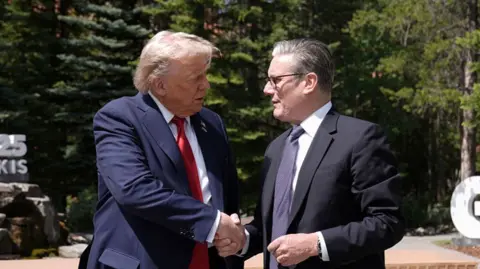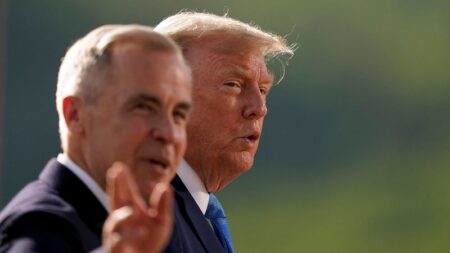In a significant development in international trade, a new tariff deal between the United Kingdom and the United States has officially come into effect. This agreement, celebrated by many industry leaders, aims to facilitate smoother trade relations and enhance market access between the two nations. The deal primarily benefits British car manufacturers, who will now enjoy preferential access to the vast U.S. consumer market, often regarded as the largest in the world.
Under the terms of the new agreement, British automotive producers are authorized to export up to 100,000 vehicles annually to the United States at a reduced tariff rate of 10%. This reduction is a substantial advantage compared to the existing international competition, which may face higher tariffs. Moreover, industries linked to UK aerospace exports have also experienced favorable changes, with tariffs on these specific goods being eliminated entirely.
However, the agreement is not without its controversies. In exchange for the favorable tariffs on vehicles and aerospace products, the UK has agreed to eliminate tariffs on imports of U.S. ethanol. This decision has raised concerns among British bioethanol producers, who argue that the removal of tariffs may undermine their ability to compete effectively in their own market.
One of the key sticking points in the negotiations has been the ongoing tariffs affecting UK steel and aluminum. Currently, these materials are subjected to a 25% tariff in the United States. A looming deadline of July 9 is critical—if no agreement is reached by that date, these tariffs could potentially double to 50%, putting additional pressure on the UK steel industry.
The trade agreement was signed at a recent G7 summit, where UK Prime Minister Sir Keir Starmer heralded it as a groundbreaking development for British trade, emphasizing its significance in protecting essential industries that are cornerstones of the UK economy. In a subsequent interview with Fox News, former U.S. President Donald Trump stated he was unlikely to extend the July 9 deadline for countries to finalize their trade deals with the U.S. to avoid these increased tariffs.
As further details of the agreement emerge, it is evident that the benefits extend to various sectors of the UK economy. The agreement allows UK car manufacturers to sell up to 100,000 vehicles to the U.S. at the reduced tariff of 10%, significantly lower than the previous tariff rate of 27.5%. This change is projected to save UK manufacturers “hundreds of millions each year” and help preserve thousands of jobs in the automotive sector, according to UK Business and Trade Secretary, Jonathan Reynolds.
In addition to the agreements concerning automotive and aerospace sectors, the UK will also abolish a 20% tariff on U.S. beef imports while increasing the quota for these imports to 13,000 tonnes. Furthermore, an allowance for 1.4 billion liters of U.S. ethanol to arrive in the UK without tariffs will eliminate the previous 19% tariff that hampered trade in this sector.
Despite the agreement’s implementation, the world of trade continues to be unpredictable, with other international partners attempting to secure favorable terms with the U.S. Thailand’s commerce minister, Pichai Naripthaphan, announced plans to negotiate with the U.S. in hopes of reducing tariffs on Thai goods, which currently sit at 36%.
In summary, while the UK-US tariff agreement marks a significant milestone in bilateral trade relations and presents numerous opportunities for various industries, it also leaves many unresolved issues, particularly concerning steel and aluminum tariffs, which remain a critical point of contention in future negotiations. As countries continue to navigate the complexities of global trade, the ripple effects of these agreements will undoubtedly impact economies far beyond the UK and the U.S.











